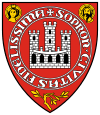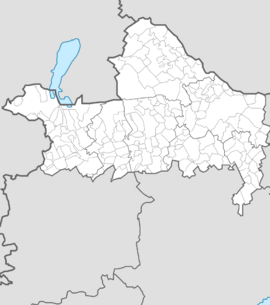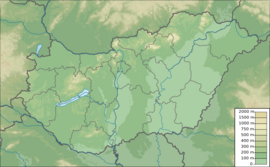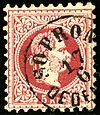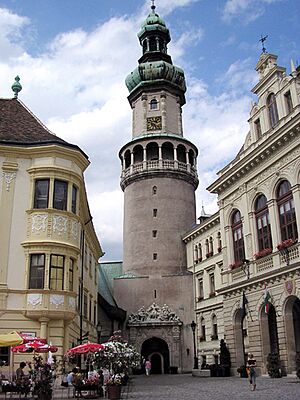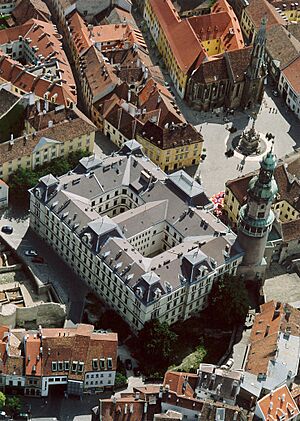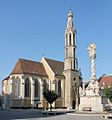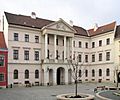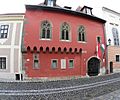Sopron facts for kids
Quick facts for kids
Sopron
Ödenburg
|
|||
|---|---|---|---|
| Sopron Megyei Jogú Város | |||
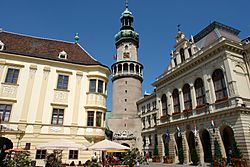      |
|||
|
|||
| Nickname(s):
Civitas Fidelissima (Most Loyal City/Citizenry)
|
|||
| Country | |||
| Region | Western Transdanubia | ||
| County | Győr-Moson-Sopron | ||
| District | Sopron | ||
| Established | 2nd century AD (Scarbantia) | ||
| Re-Established | 9th century AD (Sopron) | ||
| City status | 1277 | ||
| Area | |||
| • City | 169.04 km2 (65.27 sq mi) | ||
| Population
(2022)
|
|||
| • City | 62,116 | ||
| • Rank | 15th | ||
| • Density | 367.463/km2 (951.73/sq mi) | ||
| • Urban | 98,479 (13th) | ||
| Demonym(s) | soproni | ||
| Population by ethnicity (2011) | |||
| • Hungarians | 88.% | ||
| • Germans | 5.7% | ||
| • Croats | 0.7% | ||
| • Romani | 0.6% | ||
| • Romanians | 0.2% | ||
| • Slovaks | 0.1% | ||
| • Serbs | 0.1% | ||
| • Bulgarians | 0.1% | ||
| • Others | 0.9% | ||
| Population by religion (2011) | |||
| • Roman Catholic | 47.9% | ||
| • Greek Catholic | 1.6% | ||
| • Evangelicals | 5.6% | ||
| • Calvinists | 3% | ||
| • Jewish | 1% | ||
| • Non-religious | 5% | ||
| Time zone | UTC+1 (CET) | ||
| • Summer (DST) | UTC+2 (CEST) | ||
| Postal code |
9400
|
||
| Area code | (+36) 99 | ||
| Motorways | M85 Motorway | ||
| NUTS 3 code | HU221 | ||
| Distance from Budapest | 214 km (133 mi) West | ||
| MP | Attila Barcza (Fidesz) | ||
Sopron (pronounced SHO-pron) is a city in Hungary, located right on the border with Austria. It's also very close to a beautiful lake called Lake Neusiedl, or Lake Fertő in Hungarian. Sopron is known for its long history and its nickname, Civitas Fidelissima, which means "The Most Loyal City." This name comes from a special event in its past.
Contents
Sopron's Long History
From Roman Times to a Royal City
Long ago, when this area was part of the Roman Empire, there was a city here called Scarbantia. Its main public square, or forum, was exactly where Sopron's main square is today.
After the Romans, the city was left in ruins for a while. When Hungarians arrived, they rebuilt and strengthened the old Roman walls. They also built a castle. The city got its Hungarian name, Sopron, from a castle guard named Suprun. By 1153, it was already an important place.
In 1273, a king named Otakar II of Bohemia took over the castle. Even though he held children from Sopron's noble families as hostages, the city welcomed the armies of King Ladislaus IV of Hungary. King Ladislaus was so pleased that he made Sopron a "free royal town." This meant it had special rights and freedoms.
Sopron in Later Centuries
During the time when the Ottoman Turks were fighting in Europe, they attacked Sopron in 1529. However, they did not manage to take over the city. Many Hungarians from other areas that the Ottomans had occupied moved to Sopron, which made the city even more important.
In 1676, a big fire destroyed much of Sopron. Over the next few decades, the city was rebuilt with beautiful Baroque style buildings. Sopron became the main town of the Sopron region.
The 20th Century and Today
After World War I, the Austro-Hungarian Empire broke apart. Some parts of western Hungary, where German-speaking people lived, were planned to become part of Austria. But the people of Sopron and eight nearby villages had a special vote on December 14, 1921. They voted to stay with Hungary. About 65% of the people chose Hungary.
Because of this vote, Sopron earned its nickname, Civitas Fidelissima, meaning "The Most Loyal Town." The anniversary of this vote is still a special city holiday. However, other western parts of the region did join Austria and are now known as Burgenland.
Sopron faced tough times during World War II and was bombed several times. The Soviet Red Army took control of the city on April 1, 1945.
Later, in 1989, Sopron became famous for the Pan-European Picnic. This was a peaceful protest on the border between Austria and Hungary. Over 600 people from East Germany used this chance to escape to the West. This event helped lead to the fall of the Berlin Wall later that year.
Today, Sopron is a popular place for tourists. It has many old buildings that show its long history. Because it's so close to Austria, many street signs are in both Hungarian and German. Sopron is also known as the "dental capital of the world" because it has over 300 dental clinics! Many visitors come from nearby countries and even further away for dental services.
Wine Production
Sopron is a very important area for making wine. It's one of the few places in Hungary that makes both red and white wines. Some of the grapes grown here include Kékfrankos for red wine and Traminer for white wine. The climate here is similar to the nearby Burgenland wine region in Austria. Sopron's Kékfrankos and Pinot Noir wines are especially well-known and liked.
Sopron's People
In 1910, Sopron had about 33,931 people. About 51% were German-speaking, and 44.3% were Hungarian. Most people were Roman Catholic (64.1%) or Lutheran (27.8%).
By 2001, the city had 56,125 people. Most (92.8%) were Hungarian, and 3.5% were German. The main religion was Roman Catholic (69%).
Amazing Architecture
The older parts of Sopron are full of history. You can still see walls and foundations from the Roman Empire. There are also many beautiful buildings from the Medieval, Renaissance, and Baroque periods. These buildings are often decorated with art and show how stable and successful the city has been for centuries.
You can also find an old synagogue and other remains from the city's former Jewish community. This community was asked to leave in the 16th century.
On a hill called Daloshegy, there's a tall 165-meter broadcasting tower. People call it "Rakéta," which means "rocket" in Hungarian.
Places to Visit
- City center: Explore the historic heart of Sopron.
- Firewatch Tower: A famous landmark with great views.
- Old city walls: See parts of the ancient Roman walls.
- Széchenyi Square and Flag of Loyalty: A significant square in the city.
- Kecske Church: A beautiful old church.
- Esterházy Palace: A grand Baroque palace.
- Storno House: A Renaissance-style house with interesting history.
- Fabricius House: Another historic house to explore.
- Chemist's Museum: This house was declared Hungary's first national monument in 1525.
- Taródi Castle: A unique castle built by one man, István Taródi, starting in 1945.
Fun Things to Do
- Spring Festival of Sopron (Soproni Tavaszi Fesztivál): A festival celebrating spring.
- Festal Weeks of Sopron (Soproni Ünnepi Hetek): Weeks of celebrations in the city.
- VOLT festival: A popular music festival.
- Civitas Pinceszínház (Civitas Basement Theater): Enjoy a play in this unique theater.
- Liszt Ferenc Művelődési Központ (Franz Liszt Conference and Cultural Centre): A cultural hub named after the famous composer.
Sports in Sopron
Sopron has a very successful women's basketball team called Sopron Basket. They have won the Hungarian National Championship 15 times! In 2022, they even won the EuroLeague, which is a major European competition.
Sopron also has a football (soccer) team called Soproni VSE, which is the successor to an older club, MFC Sopron.
Notable People from Sopron
- Franz Liszt (1811-1886), a famous composer.
- Franz von Suppé (1819-1895), another well-known composer.
- László Rátz (1863-1930), a mathematics teacher.
- Béla Bartók (1881-1945), a world-famous composer.
- Charles I of Austria (1887-1922), the last king of Hungary.
- Mátyás Rákosi (1892-1971), a political leader.
- Tímea Babos (born 1993), a professional tennis player.
Sister Cities
Sopron has "sister city" relationships with many cities around the world. These connections help promote cultural exchange and friendship.
 Bad Wimpfen, Germany
Bad Wimpfen, Germany Banská Štiavnica, Slovakia
Banská Štiavnica, Slovakia Bolzano, Italy
Bolzano, Italy Eilat, Israel
Eilat, Israel Eisenstadt, Austria
Eisenstadt, Austria Kazuno, Japan
Kazuno, Japan Kempten, Germany
Kempten, Germany Mediaș, Romania
Mediaș, Romania Rorschach, Switzerland
Rorschach, Switzerland Seinäjoki, Finland
Seinäjoki, Finland Sparta, Greece
Sparta, Greece
Images for kids
-
Statue of István Széchenyi
See also
 In Spanish: Sopron para niños
In Spanish: Sopron para niños
 | DeHart Hubbard |
 | Wilma Rudolph |
 | Jesse Owens |
 | Jackie Joyner-Kersee |
 | Major Taylor |



